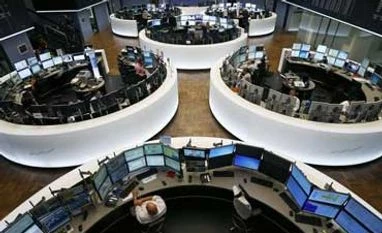European stocks rebounded from last week's heavy selloff on Monday and the dollar rose broadly, with investors reassured by stability in China's yuan exchange rate after it was fixed slightly higher for the second day running.
Asian markets were more volatile, however, and emerging market currencies and oil prices were anchored near historic lows.
The FTSEuroFirst 300 index of leading shares was up 0.8% at 1,540 points, clawing back some of last week's 3% decline - its biggest loss in six weeks.
Wall Street was expected to open higher.
Germany's DAX was up 0.6% and France's CAC 40 up 0.7%. Britain's resource and commodity-heavy FTSE 100, however, was 0.2% lower.
"European equities, based off results thus far, are showing slightly stronger earnings than Q1, with financials leading earnings growth," said Brenda Kelly, head analyst at London Capital Group.
More From This Section
Alstom shares rose as much as 7% after two people familiar with the matter told Reuters General Electric was expected to secure European Union approval for a proposed 12.4 billion euro bid for its power business.
Shares in Hennes & Mauritz advanced 2.4% after the fashion retailer reported higher sales.
Earlier in Asia, MSCI's broadest index of Asia-Pacific shares outside Japan fell 0.8%, adding to last week's loss of 2.6% suffered after Beijing's devaluation of the yuan buffeted global financial markets and fanned concerns about China's economy.
SMALL IN JAPAN
The yuan fell more than 4% at one point last week, pulling down riskier assets including emerging currencies globally amid fears the devaluation would spark a global currency war. But China slowed the pace of the currency's drop, and on Monday fixed it higher for the second day in a row.
Emerging currencies continued to struggle. The rouble hit a six-month low, Malaysia's ringgit held near a 17-year low and Turkey's lira fell to its weakest on record.
With the big focus whether the Fed raises interest rates as early as next month, the dollar was the major winner in currency markets.
"With reduced volatility, fears on passthrough from the China devaluation to Fed policy should subside and this may see focus shift back to the situation in the United States," wrote Todd Elmer, head of Citi's G10 strategy in Singapore.
The euro fell a third of one percent to $1.1072.
Euro investors also weighed up the growing likelihood that the Greek government will call a confidence vote following a rebellion among lawmakers from the ruling Syriza party over the country's new 86 billion euro bailout deal.
The dollar gained 0.2% against the yen after Japan's economy shrank in the second quarter.
The 0.4% contraction wasn't as large as the 0.5% fall expected, but concerns that the third quarter may see only mild improvement are rekindling expectations of further monetary easing by the Bank of Japan.
In bond markets, the benchmark 10-year US Treasury yield slipped two basis points to 2.18%.
Crude oil, another market churned last week by China's shock currency move and its potential impact on demand for commodities, continued to struggle in the wake of global oversupply concerns.
US crude was down 1.8% at $41.73 a barrel, within reach of a six-year trough of $41.35 struck on Friday.
)